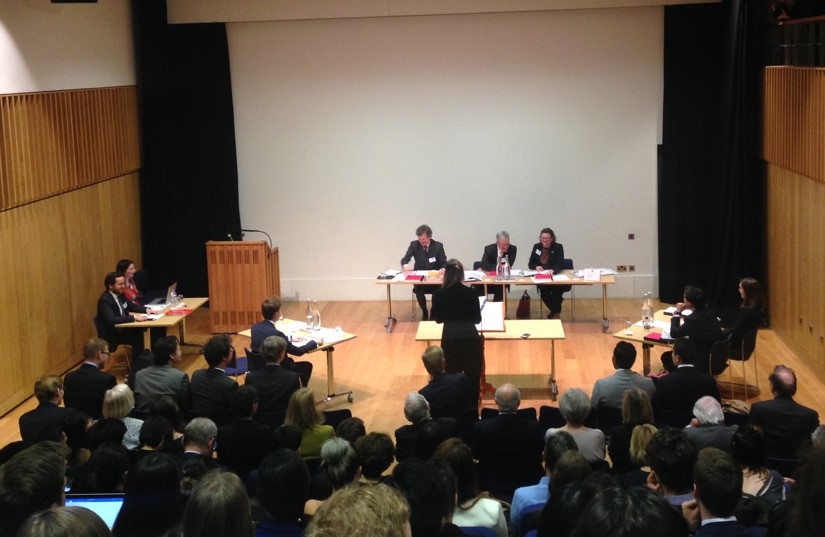 From the 15th March 2017 to the 18th March 2017, the University of Cambridge team travelled to Pembroke College, Oxford, to compete in the 15th Oxford International Intellectual Property Moot.
From the 15th March 2017 to the 18th March 2017, the University of Cambridge team travelled to Pembroke College, Oxford, to compete in the 15th Oxford International Intellectual Property Moot.
This year’s moot problem concerned a patented glass bottle shape with internal dimples in which a sparkling wine called ‘Erewine’ was sold. The dimples enhance the effervescence of sparkling drinks and slow the rate at which the drinks would lose their effervescence. There was an appeal and cross-appeal concerning three points of law: patent infringement, patent validity and extended passing off. Firstly, whether a patent claim specifying use for sparkling wine excludes the use of the patented bottle shape for non-sparkling wines, or extends to all sparkling beverages which seek to benefit from the invention. Secondly, whether the bottle’s misuse by 18-25 year olds looking to get drunk quickly is contrary to ordre public and morality, and whether the patent should therefore be invalidated. Thirdly, whether the word ‘Erewine’ – a wine produced by a grape exclusively grown in the fictional Erewhon – would benefit from extended passing off when used by the defendant for non-alcoholic, elderflower wine.
In order to get to the oral stage, teams sent in two sets of written submissions, one on behalf of the Appellant and the other for the Respondent. Out of the 59 teams that had sent in submissions, only 24 university teams from across the world were admitted to the oral rounds.
In the months leading up to the oral rounds, we had the benefit of support from Professor Lionel Bently and Dr Christina Angelopoulos who supervised our team. We were also grateful to receive support from Dr Kathy Liddell and Dr Jennifer Davis who provided advice. Our team was able to travel down to 11 South Square Chambers in London, where barristers Anna Edwards-Stewart and Tom Alkin kindly provided very useful feedback and support on our mooting performance.
The mooting competition started in the afternoon, on the 16th March, and consisted of the preliminary rounds, quarter-final, semi-final and grand final. The preliminary rounds were intense, spread over 2 days, Thursday and Friday, involving 4 moots.Two mooters were permitted to compete in each round, so we took turns to moot against the following universities: Monash University, The University of Toronto, Jindal Law School and Tsinghua University.
After the preliminary rounds, there was a Conversazione, which was a lecture called “Wine and Sweet Words”. This related to Intellectual Property and its relationship with branding as well as the moot problem. The lecture was held by a range of academics, including Dr Jennifer Davis, alongside QCs and judges. It was followed by a formal dinner and a discussion.
 The quarter-final result was announced during the dinner and whilst the Cambridge team did not progress, being a part of the competition allowed us to interact with other law students, professionals and academics within the Intellectual Property Law community.
The quarter-final result was announced during the dinner and whilst the Cambridge team did not progress, being a part of the competition allowed us to interact with other law students, professionals and academics within the Intellectual Property Law community.
Lord Justice Floyd, Her Honour Judge Clarke and Mr Justice Birss judged the highly anticipated final between Bucerius Law School and the University of Toronto. Both teams were fantastic, but Bucerius were exceedingly charming and it was no surprise that they won in the end.
It was eye-opening to see the different mooting styles of different teams from around the world. The competition proved challenging in trying to balance moot preparations alongside intensive studies and commitments. Nonetheless, it was an intellectually stimulating and a thoroughly enjoyable experience.
Hermon Bahru, David Ifere & Constance Armengaud

 Facebook
Facebook  X/Twitter
X/Twitter  Instagram
Instagram  YouTube
YouTube  Flickr
Flickr  LinkedIn
LinkedIn